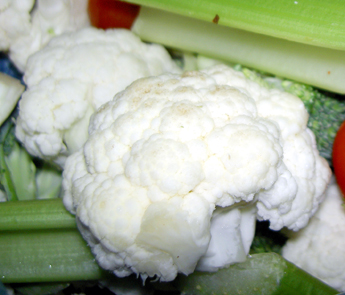Health Benefits of Cauliflower and Cauliflower Juice

Cauliflower is often a forgotten vegetable and has received a bad reputation. Although it is not as exciting as some of its other cruciferous cousins, cauliflower is a versatile vegetable that is full of amazing health benefits. Whether eaten raw in a salad, as a snack, or cooked as a side disk, it is full of nutritional value and flavor.
Table of Contents
Health Benefits
Recent studies have shown that cauliflower has one of the largest concentrations of health promoting sulfur compounds. These compounds increase the ability of the liver to produce enzymes that can neutralize toxic substances, and stop enzymes from activating cancer causing agents in the body. In addition to this health benefit, cauliflower is also an excellent source of Vitamin C, Vitamin K, Folate and Dietary Fiber. Additional benefits include:
- Cauliflower supports heart health because of its excellent source of folic acid and Vitamin B6. These nutrients help metabolize a compound called, homocysteine, which has proven to be harmful to arterial walls and cardiovascular disease. The high folate content helps the development of the fetus during pregnancy and prevents neurological defects in the fetus.
- Dietary fiber is an essential nutrient for every diet and especially those with cholesterol problems and those with weight issues. Cauliflower is an excellent source soluble and insoluble fiber.
- It also contains significant amounts of omega-3 essential fatty acids, Vitamin C, potassium, alpha-linolenic acid, magnesium and niacin – all excellent nutrients beneficial for heart health.
- Cauliflower has shown to have enzymes that help with the detoxification process.
- At just 29 calories per cooked cup of cauliflower, it is a great addition to the diet for those looking to lose weight or maintain weight.
- It contains compounds that prevent chronic inflammation and thereby helps prevent chronic pains and arthritis.

- The low carbohydrate content in combination with the low glycemic index makes it more than suitable for people with diabetes mellitus.
- Cauliflower is rich in organic boron which aids the absorption of calcium and magnesium. This in turn improves the bone development and prevents osteoporosis.
Concentrated sources of other nutrients include, Vitamin B1, B2, B5 and phosphorus (which provide energy), manganese (which provides free radical scavenging support), and is a good protein source.
Cauliflower is great for the digestive system. This is because of glutamine, an amino-acid found in this plant. Glutamine calms, detoxifies and heals the digestive system, and can even help with ulcers.
The latest studies on cauliflower indicate that to enhance health benefits, you should prepare your vegetable by cutting it into small pieces. It is suggested that cutting the florets into smaller pieces, will activate an enzyme called myrosinase. By cutting into smaller pieces and allowing to sit for 5 to 10 minutes before eating or cooking, you will increase the health benefits, and enhance the concentration of phytonutrients.
In order to maximize cauliflowers nutrients and enhance its flavor, you should eat it raw whenever possible. However, if you want to cook it, you should sauté for about 5 minutes. This will bring out a mildly sweet, nutty flavor, while protecting its nutrients. Many people overcook cauliflower which ruins the flavor and turns many people off. It should be tender but still crisp to protect its flavor and nutrients. It is not recommended to boil, steam, bake or cook with oil.
Juicing Cauliflower
 You should choose the cauliflower with bulky, green leaves, as they protect the head. Avoid the cauliflowers with dark spots on their surface. Be aware that cauliflower florets often contain various bugs and germs. To eliminate them you can briefly immerse the cauliflower in salty boiling water before juicing. In general blanching any type of vegetable helps remove germs and bugs that otherwise are difficult to be removed. Another beneficial consequence of this procedure is that blanching before juicing will reduce the amount oxalates in the cauliflower itself, as most of it will be absorbed in the cooking water. You should through away this cooking water afterward.
You should choose the cauliflower with bulky, green leaves, as they protect the head. Avoid the cauliflowers with dark spots on their surface. Be aware that cauliflower florets often contain various bugs and germs. To eliminate them you can briefly immerse the cauliflower in salty boiling water before juicing. In general blanching any type of vegetable helps remove germs and bugs that otherwise are difficult to be removed. Another beneficial consequence of this procedure is that blanching before juicing will reduce the amount oxalates in the cauliflower itself, as most of it will be absorbed in the cooking water. You should through away this cooking water afterward.
Juicing is one of the best way to get all the healthy nutrients from cauliflower, in particular, phosphorus and potassium. In small amounts, Cauliflower juice, can be used as a therapeutic treatment to help the digestive system. Because of its characteristic smell, it is best consumed if juiced together with celery, or carrots. You can also use it in your green smoothies.
Some people, in effort to improve its flavor, mix it with fruits. We don’t recommend that. Despite what many people think, fruits are not the healthiest type of food out there. If you absolutely have to, use small amounts of berries, or other low-fructose fruits.
For therapeutic purpose, take this juice in small amounts three times a day on an empty stomach. Mix with some carrot and celery juice if the taste is unpalatable for you.
Possible Side effects
Cauliflower doesn’t contain high levels of oxalic acid – it is a low-oxalate food. As much as that’s great news, Cauliflower unfortunately contains purine. Purine is a natural occurring compound found in Cauliflower. The byproduct of ingesting purine is the uric acid. Too much purine in the body can lead to higher levels of uric acid. This may cause problems in individuals who have problems related to purine, such as kidney stones or gout. For them, it is advisable limiting the intake of cauliflower.
Frequently Asked Questions
Should I Add Water to Cauliflower Juice?
Yes, you could if you like, provided that the water is not tap water. It’s a matter of taste more than anything else. We also like diluting our juices with pure quality water.
Is Cauliflower Juice Good for Wart Removal?
Yes. Using your home made cauliflower juice is a great method for removing warts naturally. After you’ve prepared the juice, rub some of it onto the wart. Be persistent for something like 10-15 days, and your problem will be greatly reduced or solved.
Will Cauliflower Juice Cause Bloating?
Yes, cauliflower juice may cause bloating and gas in your digestive system. Like the other cruciferous vegetables, it does contain sulfur compunds that lead to gas, but the effect should be less pronounced. A part of the cauliflower’s carbs are non digestible, which also contributes to the effect.

when you mention side effects, what about iodine absorption, how seriously it can be impaired??
I didn’t know about iodine absorption problems related to cauliflower. I looked it up and it seems that all cruciferous veggies interfere with the absorption of this important micro-element.
Iodine is important for the proper functioning of the thyroid gland. Cruciferous vegetables have some sugar-like molecules that interfere with iodine absorption. But this may only happens if you are on a diet of cruciferous vegetables entirely.
I have never really tried cauliflower in my juices: I was never really a fan of the taste but I will definitely give it a try. Thanks for sharing the info.
Hi Adam and thanks for coming by, reading, and commenting. What I have learned in my experiences with different foods is that the taste is just a matter of getting used to. Just go slow, and, after a couple of times, it doesn’t taste bad at all, and then you even start to like how it tastes.
So does it mean that those who have problems with uric acid should avoid cauliflower intake?
Please help with your answer.
Yes, by all means. And not only cauliflower. More serious could be the intake of fructose, either in refined foods (as high fructose corn syrup, for example) or in fruits with high fructose content. You can check the fructose content in fruits here.